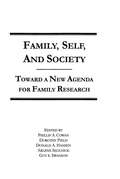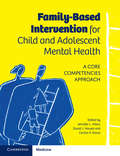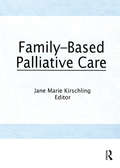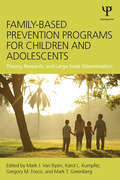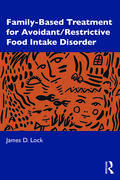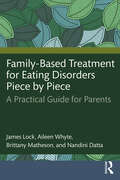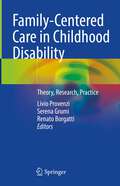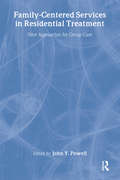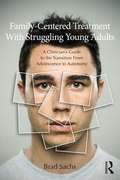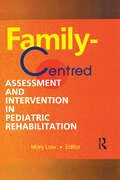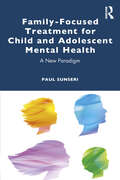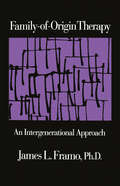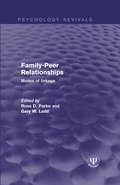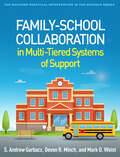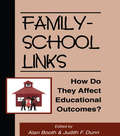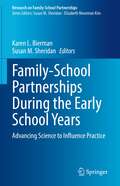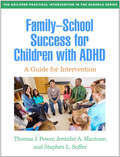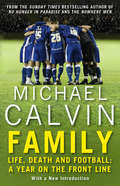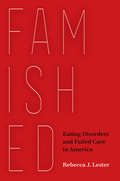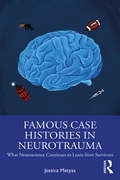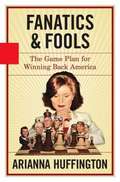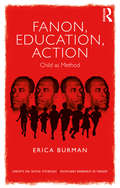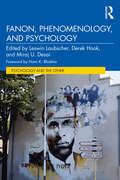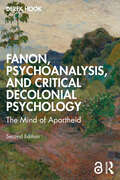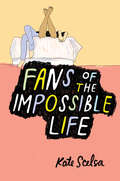- Table View
- List View
Family, Self, and Society: Toward A New Agenda for Family Research
by Arlene Skolnick Philip A. Cowan Dorothy Field Donald A. Hansen Guy E. SwansonAny agenda for family research in the 1990s must take seriously a contextual approach to the study of family relationships. The editors and contributors to this volume believe that the richness in family studies over the next decade will come from considering the diversity of family forms -- different ethnic groups and cultures, different stages of family life, as well as different historical cohorts. Their goal is to make more explicit how we think about families in order to study them and understand them. To illustrate the need for diversity in family studies, examples are presented from new and old families, majority and minority families, American and Japanese families, and intact and divorcing families. This variety is intended to push the limits of current thinking, not only for researchers but also for all who are struggling to live with and work with families in a time when family life is valued but fragmented and relatively unsupported by society's institutions. Students and researchers interested in family development from the viewpoint of any of the social sciences will find this book of value.
Family-Based Intervention for Child and Adolescent Mental Health: A Core Competencies Approach
by Cecilia A. Essau Jennifer L. Allen David J. HawesThe most effective treatments for child and adolescent psychopathology are often family-based, emphasising the active involvement of family members beyond the referred individual. This book details the clinical skills, knowledge, and attitudes that form the core competencies for the delivery of evidence-based family interventions for a range of mental health problems. Offering practical case studies to illustrate treatment principles, and discussing barriers to treatment and problem-solving in relation to common difficulties. Covers topics such as anxiety, attention-deficit hyperactivity disorder, sleep, and eating disorders. Therapist competencies are thoroughly examined, from the role they play in severe/complex cases and in achieving successful outcomes to commonly misunderstood aspects of family-based interventions and how they can be enhanced. Clinical approaches to working with diverse families, and those of children affected by parental psychopathology, child maltreatment and family violence are also explored. Essential reading for psychologists, psychiatrists, paediatricians, mental health nurses, counsellors and social workers.
Family-Based Palliative Care
by Jane Marie KirschlingLearn to interact with families in ways that promote family functioning when a family member is dying. Family-Based Palliative Care is an insightful book that aims to increase professionals’understanding of the family as client. Authoritative contributors who are experienced in working with the terminally ill present the most current theory, practice, and research related to family-based care of hospice patients. Each readable chapter includes a wealth of information that can be applied to health care settings in which holistic care is a priority. The first chapter presents a conceptual framework for caring for families of the terminally ill as well as clinical examples that are used to illustrate the application of the framework in practice. Experts describe four research studies--two qualitative studies that examine sources of stress for caregivers and identify the resources used by families to manage at home; a methodological study that explores the positive and negative aspects of family caregiving; and a case study that evaluates a hospice staff’s efforts in providing family- based care.Because little research has been done with family caregivers of terminally ill hospice patients, Family-Based Palliative Care will be essential reading for nurses, social workers, hospice staff, and other professionals whose job it is to care for the dying and their families.
Family-Based Prevention Programs for Children and Adolescents: Theory, Research, and Large-Scale Dissemination
by Mark T. Greenberg Mark J. Van Ryzin Karol L. Kumpfer Gregory M. FoscoIn addition to introducing readers to the field of family-based prevention science, Family-Based Prevention Programs for Children and Adolescents highlights the distinctive contributions of a set of exemplary programs in terms of their foundational theory, design, delivery mechanisms, performance, and unique opportunities for future research. It is organized into three sections to orient readers to: the existence of different types of family-based programs targeting families with children of different ages; the strategies and challenges that arise when attempting large-scale dissemination of prevention programs; and, the emerging innovations that promise to push the field forward into uncharted territories. Each chapter is written by a preeminent program developer, including: Gene H. Brody Richard F. Catalano Patricia Chamberlain Thomas J. Dishion Marion S. Forgatch Kevin P. Haggerty Cleve Redmond Matthew R. Sanders Richard L. Spoth Carolyn Webster-Stratton Contributors review the state of the research and then provide a summary of their own program, including research and dissemination efforts. They also discuss take-home lessons for practitioners and policymakers, and provide their view of the future of program development and research in their area. As an important signpost signifying the noteworthy achievements of the field to date, as well as an arrow pointing the field toward significant growth in the future, this book is a must-have primary resource for graduate students in developmental or clinical psychology, counseling, family sciences, social work, or health policy, and an essential guide for practitioners and policymakers in the field of family-based prevention, family service delivery, or public health.
Family-Based Treatment for Avoidant/Restrictive Food Intake Disorder
by James D. LockThis book describes the theoretical and clinical rationale for the use of Family-Based Treatment (FBT) for Avoidant/Restrictive Food Intake Disorder (ARFID). Based on years of clinical care and systematic study of children and adolescents with ARFID using Family-Based Treatment for Avoidant/Restrictive Food Intake Disorder (FBT-ARFID), the manual provides guidance about assessment of ARFID. Topics covered include how to incorporate the medical, nutritional, and psychiatric problems that are common with this disorder and how to evaluate the principle maintaining behaviors related to lack of interest or appetite, extreme sensory sensitivities to food, and fear of physical repercussions of eating (e.g. pain, vomiting, allergic reactions). Step-by-step illustrations of the key interventions in FBT-ARFID are provided and detailed case discussions demonstrate how these are implemented in a range of cases. Ideal for clinical practitioners who treat children and adolescents with eating disorders, specifically, psychologists, psychiatrists, social workers, and allied health practitioners.
Family-Based Treatment for Eating Disorders Piece by Piece: A Practical Guide for Parents
by James Lock Aileen Whyte Brittany Matheson Nandini DattaThe book illustrates how parents who are participating in family-based treatment (FBT) for their child's eating disorder (ED) may enhance their chances of achieving optimal outcomes for their child by more successfully navigating the challenges that often impede progress in treatment and recovery.The stance of the book is transdiagnostic, so that the information provided spans all ED diagnoses including anorexia nervosa (AN), bulimia nervosa (BN), binge eating disorder (BED), avoidant/restrictive food intake disorder (ARFID), and atypical ED presentations as well as conditions that fall outside current diagnostic criteria. This book aims to help parents identify how they can make the most out of FBT therapy no matter which ED symptoms their child experiences. Case vignettes across the diagnostic and clinical spectrum are used liberally throughout the book, not only to illustrate examples of some of the specific challenges families face, but to help parents normalize the emotions they may feel around their experience of trying to help their child and around their experience of participating in the FBT intervention itself. A respectful and supportive tone makes this resource accessible and jargon-free for parents, and provides useful information and approaches for psychologists, psychiatrists, social workers, and allied health practitioners who deliver FBT to young people and families.
Family-Centered Care in Childhood Disability: Theory, Research, Practice
by Livio Provenzi Serena Grumi Renato BorgattiThe book presents a comprehensive and well-organized overview of the family-centered care approaches for child disability, and provides multi-professional contributions from the fields of psychiatry, psychology, and rehabilitation science. The volume is divided into three main sections, that highlights the theoretical basis, research evidence, and clinical implications of the family-centered approach to child care. Active engagement of parents in the therapeutic and rehabilitative journey of their children with disability is key to the success of early interventions and their long-term benefits. Research and clinical experiences in healthcare services around the world suggest that early supportive programs may promote children’s development at its best, with both clinical benefits and economic advantages for the healthcare system. This volume will appeal to a wide readership, from clinicians and researchers in child disability and rehabilitation, to students and professionals in the fields of psychiatry, psychology, and rehabilitation science.
Family-Centered Services in Residential Treatment: New Approaches for Group Care
by John Y PowellAdopt a more effective approach to temporary and long-term residential care! Presenting the voices of staff, parents, and residents, Family-Centered Services in Residential Treatment: New Approaches for Group Care examines the changes and challenges of residential care from the old-fashioned orphanage to the modern group-care home. These thoughtful essays offer suggestions and methods to provide more effective services in temporary and long-term settings. Containing case studies, personal experiences, and professional insights about the potentials and limitations of residential care, this reliable resource will help you develop improved services for youths and their families. Family-Centered Services in Residential Treatment presents fresh evaluations of new and old techniques as well as ideas for meeting individual needs. By building connections among parents, youths, and staff, you can develop more successful treatment programs and encourage stronger family ties even when children are best served by long-term residential care.Family-Centered Services in Residential Treatment addresses the crucial questions of residential care, including:how can staff ease children's transitions into and out of residential care? what do parents of emotionally disturbed youth need from the staff and professionals in a residential care setting? what was right--and wrong--about the old-fashioned orphanage? Could such an institution work today? how does the transition to the teamwork approach affect staff members? when is residential care most beneficial to children? what kind of care is appropriate for AIDS orphans?Family-Centered Services in Residential Treatment will help psychologists, therapists, and social workers unite theory and practice to create a family-oriented environment for troubled clients.
Family-Centered Treatment With Struggling Young Adults: A Clinician’s Guide to the Transition From Adolescence to Autonomy
by Brad SachsFamily-Centered Treatment With Struggling Young Adults is an indispensible guidebook to the unique set of problems and opportunities that families face when young adults are experiencing difficulty pulling anchor and setting sail. Renowned clinician Brad Sachs, PhD, provides both a conceptual framework for understanding the reasons behind the increasing number of young adults who are unable to achieve psychological and financial self-reliance and a treatment framework that will enable practitioners to help these young adults and their families to get unstuck and experience age/stage-appropriate growth and development. In Family-Centered Treatment With Struggling Young Adults, clinicians will gain an in-depth understanding of the complex psychological challenges that parents and young adults face as the latter forges a path towards success and self-reliance. Moreoever, they'll come away from the book having learned an innovative approach to sponsoring family engagement ant the launching stage—one that reduces tension, resolves conflicts, and promotes evolution and differentiation on both generations’ parts.
Family-Centred Assessment and Intervention in Pediatric Rehabilitation
by Mary LawFamily-Centred Assessment and Intervention in Pediatric Rehabilitation analyzes the effectiveness of Family-Centred Services (FCS) for children with disabilities or chronic illnesses. This text provides you with the exact definition of FCS and offers proof that parent involvement in children's treatment greatly enhances therapy. You can use the suggestions and methods to integrate parents into therapy, maximizing the family's intervention experiences and making your work more successful and effective.Many clinicians agree that families play a crucial part in deciding what intervention strategies are best for their children. From this text, you will learn that listening to parents and valuing parental input will give you insight into the goals, needs, and ambitions families have for their children. This enables you to choose, with the parent, the interventions that best suit your patients’needs and the needs of their families. In addition to information on how to integrate parents and families into intervention, Family-Centred Assessment and Intervention in Pediatric Rehabilitation offers suggestions that will improve your existing FCS or help you implement a family- centred approach, including:performing therapy in natural settings, such as school or home, to make changes in the children's social and physical environmentsacknowledging the grieving and adaptation process of families while being compassionate and understandingletting parents describe what they would like their child to be able to do and accomplish in the future putting the parents’concerns and requests first, enabling parents to deal with caring for their child supporting parents and reinforcing them when they have innovative and helpful ideasinforming parents on the progress of their children and educating parents on methodologies and strategies used in FCSMany of the suggestions derived from the analysis of current data and original research in Family-Centred Assessment and Intervention in Pediatric Rehabilitation have immediate clinical applicability, allowing you to quickly adapt methods into your intervention processes. This text also provides you with information on types of evaluative methods, such as Measure of Processes of Care (MPOC) and Family-Centred Program Rating Scale (Fam PRS), that will help you determine if your FCS program is working efficiently. Emphasizing the goal of parent interaction in FCS services, Family-Centred Assessment and Intervention in Pediatric Rehabilitation offers methods that will improve your work with families and patients, making services more beneficial and relevant to the child and to their families.
Family-Focused Treatment for Child and Adolescent Mental Health: A New Paradigm
by Paul A. SunseriThis book is designed as a treatment manual for using family-based treatments with children struggling with mental illness, supporting both family therapists and the families they are helping. Based on over 40 years of research, it has been shown that involving the entire family in treatment is effective. However, family therapy is still not used as a first line of treatment. Paul Sunseri explains and explores why family-based approaches should be used with struggling young people and how this can be applied in practice. Chapters discuss the causes, contributors, and social determinants for the rise in childhood mental illness and provide empirical evidence and treatments for working with children and adolescents suffering from self-harm, suicidal ideation, anxiety, anger, and depression. Filled with case studies throughout, the book also touches on mitigating the effects of screen time in our increasingly technological lives and interventions to help reluctant children participate in therapy. This book will be invaluable reading for graduate-level students, clinicians in training, and fully licensed clinicians, such as psychologists, psychiatrists, marriage and family therapists, and clinical social workers. The book is also a practical resource for parents and other caregivers; it pulls back the curtain on therapy and teaches parents exactly what to do to best love and support their child at a time when they need it the most.
Family-Of-Origin Therapy: An Intergenerational Approach
by James L. FramoFirst published in 1993. Routledge is an imprint of Taylor & Francis, an informa company.
Family-Peer Relationships: Modes of Linkage (Psychology Revivals)
by Ross D. Parke Gary W. LaddOriginally published in 1992, this volume provided an up-to-date overview of recent research concerning the links between family and peer systems. Considerable work in the past had focused on family issues or peer relationships, but these systems had typically been considered separately. This volume bridges the gap across these two important socialization contexts and provides insights into the processes that account for the links across the systems – the ways in which the relationships between these systems shift across development. In addition, the variations in the links between family and peers are illustrated by cross-cultural work, studies of abused children, and research on the impact of maternal depression. In short, the volume provides not only a convenient overview of recent progress at the time but lays out an agenda for future research.
Family-School Collaboration in Multi-Tiered Systems of Support (The Guilford Practical Intervention in the Schools Series)
by Mark D. Weist S. Andrew Garbacz Devon R. MinchFamily–school collaboration has proven benefits for students&’ social, emotional, behavioral, and academic functioning, yet many schools struggle to create and sustain effective partnerships with families. This timely resource provides an equity-focused, culturally responsive framework for embedding family collaboration within multi-tiered systems of support (MTSS). The field-leading authors present best practices for involving families in data-based decision making and problem solving at Tiers 1, 2, and 3. Chapters from guest experts address key issues in implementation, including detailed case studies. In a convenient large-size format, the book provides implementation guides, practitioner vignettes, candid parent quotations, and reproducible checklists, forms, and sample scripts that can be downloaded and printed. This book is in The Guilford Practical Intervention in the Schools Series, edited by Sandra M. Chafouleas.
Family-School Links: How Do They Affect Educational Outcomes? (Penn State University Family Issues Symposia Series)
by Alan Booth Judith F. DunnBased on the presentations and discussions from a national symposium on family-school links held at the Pennsylvania State University, this volume brings together psychologists, sociologists, educators, and policymakers studying the bidirectional effects between schools and families. This topic -- the links between families and schools, and how these affect children's educational achievement -- encompasses a host of questions, each of key social and educational significance. * How far does parental involvement in schools affect children's experiences and achievement at school? * What explains the great differences between schools, families, and communities in the extent of such involvement? * Are these differences a matter of school practices, or do they reflect much broader social and cultural divisions? * What is the nature of the impact schools have on children and their families? * How can family-school-partnerships be fostered in a way that helps children? The chapter authors consider these questions and related issues, present different perspectives, highlight various aspects of the issues, and suggest widely differing answers. This volume's goal is to provide the reader with current information on what is known about family-school-community links, and to provoke new ways of thinking about these links and their implications for children's education and well-being.
Family-School Partnerships During the Early School Years: Advancing Science to Influence Practice (Research on Family-School Partnerships)
by Susan M. Sheridan Karen L. BiermanThis book presents research-based family-school intervention programs that target the specific developmental period of preschool through the early elementary years, focusing on promoting positive child transitions into school. It explores critical intervention issues, including the need to understand mechanisms of efficacy, issues with real-world implementation, and methods for scaling family-school interventions. The volume references developmental research to highlight the importance of family-school partnerships at this critical transition period. Several chapters briefly describe research on proven intervention models that are effective in promoting family-school partnerships as children enter kindergarten and foster positive school outcomes. Each chapter concludes with a review of the most critical next steps in family-school intervention research within the context of the early school years. At the end of the book, several commentary chapters address overall implications for future research and methods for advancing the field, including perspectives on research-informed family-school practices and policies. Not only does the volume highlight interventions that work effectively to engage families with schools, it focuses on identifying critical components and processes that may underlie effective intervention outcomes and offers agendas for future research and intervention diffusion efforts. Key topics of coverage include: Presenting the logic model of the intervention program.Exploring questions concerning critical elements of family-school partnerships that may account for children’s positive outcomes.Discussing the challenges and strategies for scalability and broad diffusion. Family-School Partnerships During the Early School Years is a valuable resource for researchers, professionals and graduate students in child and school psychology, educational policy and politics, family studies, developmental psychology, sociology of education, sociology, and anthropology.
Family-School Success for Children with ADHD: A Guide for Intervention (The Guilford Practical Intervention in the Schools Series)
by Thomas J. Power Jennifer A. Mautone Stephen L. SofferDistilling decades of research, this practical manual presents an innovative intervention for families of 6- to 10-year-olds (grades 1–5) with attention-deficit/hyperactivity disorder (ADHD). Family–School Success (FSS) focuses on improving children's behavior and academic performance by strengthening parent–child, teacher–student, and family–school relationships. Detailed guidelines are provided for implementing FSS with parent groups or individual families, including how to involve children in groups and collaborate with teachers. The authors discuss ways to deliver FSS effectively in school- and clinic-based settings, private practice, and primary care. In a convenient large-size format, the book features dozens of reproducible parent handouts and worksheets, assessment tools, and fidelity checklists, which can also be downloaded and printed. This book is in The Guilford Practical Intervention in the Schools Series, edited by Sandra M. Chafouleas.
Family: Life, Death and Football: A Year on the Frontline with a Proper Club
by Michael CalvinFrom the award-winning author of NO HUNGER IN PARADISEOutside the global spotlight, footballers don't drive Aston Martins or pose for underwear ads. This is war. This is life. This is football.Michael Calvin turned up for the first day of pre-season training at Millwall FC. 333 days later, he sat among the subs at Wembley.Over the course of a season, he witnessed the intimate everyday life of a football club far from the glitz and glamour of the Premier League, and the unique characters that come together every day on the field. These are dedicated, hard-working family men, close to their roots, 'playing for the people who hate their jobs, who'd love our lives.' Forget about the over-hyped circus of the Premier League. This is the beautiful game in all its raucous glory: essential reading for anyone whom football is a way of life.
Famished: Eating Disorders and Failed Care in America
by Rebecca J. LesterWhen Rebecca Lester was eleven years old—and again when she was eighteen—she almost died from anorexia nervosa. Now both a tenured professor in anthropology and a licensed social worker, she turns her ethnographic and clinical gaze to the world of eating disorders—their history, diagnosis, lived realities, treatment, and place in the American cultural imagination. Famished, the culmination of over two decades of anthropological and clinical work, as well as a lifetime of lived experience, presents a profound rethinking of eating disorders and how to treat them. Through a mix of rich cultural analysis, detailed therapeutic accounts, and raw autobiographical reflections, Famished helps make sense of why people develop eating disorders, what the process of recovery is like, and why treatments so often fail. It’s also an unsparing condemnation of the tension between profit and care in American healthcare, demonstrating how a system set up to treat a disease may, in fact, perpetuate it. Fierce and vulnerable, critical and hopeful, Famished will forever change the way you understand eating disorders and the people who suffer with them.
Famous Case Histories in Neurotrauma: What neuroscience continues to learn from survivors
by Jessica MatyasUsing a popular case history format, this book presents a scientific history of neurotrauma. It covers a range of well-known cases, including Roald Dahl, James Brady, and Walter Freeman to give insights into a variety of neurotrauma causes and effects, from aphasia and amnesia to lobotomy and mercury toxicity. Cases are connected to clinical research methods, exploring how these methods have changed over time and illustrating how these cases are still relevant as we continue to learn about recovery from brain and spinal cord injuries. Focusing on individuals who survived their injuries beyond the acute phase, the book highlights the long-term behavioral effects of the injuries and provides estimates for prognoses and recovery pathways in acknowledgment of naturally occurring neuroregeneration. With helpful key term definitions, Matyas distinguishes fact from fiction to give an accurate account of a wide spectrum of cases and highlight what we can learn from them. Famous Case Histories in Neurotrauma is valuable reading for students in behavioral neuroscience, clinical neuropsychology and related fields.
Fanatics and Fools: The Game Plan for Winning Back America
by Arianna HuffingtonAs America's leaders fight pre-emptive wars abroad and ordinary Americans fight to keep their heads above water here at home, Arianna Huffington offers a no-holds-barred account of where we stand and a clear and remarkable vision of where we should be headed.
Fanon, Education, Action: Child as Method (Concepts for Critical Psychology)
by Erica BurmanBridging childhood studies, pedagogy and educational theory, critical psychology, and postcolonial studies, this unique book reads the role and functions of ‘the child’ and childhood as both cultural motif and as embodied life condition through the work of Frantz Fanon. Based on innovative readings of Fanon and postcolonial cultural studies, the book offers new insights for critical pedagogical and transformative practice in forging crucial links not only between the political and the psychological, but between distress, therapy, and (personal and political) learning and transformation. Structured around four indicative and distinct forms of ‘child’ read from Fanon’s texts (Idiotic, Traumatogenic, Therapeutic, Extemic), the author discusses both educational and therapeutic practices. The pedagogical links the political with the personal, and Fanon’s revolutionary psychoaffective account offers vital resources to inform these. Finally the book presents ‘child as method’ as a new analytical approach by which to read the geopolitical, which shows childhood, education, and critical psychological studies to be key to these at the level of theory, method, and practice. By interrogating contemporary modalities of childhood as modern economic and political tropes, the author offers conceptual and methodological resources for practically engaging with and transforming these. This book will be vital and fascinating reading for students and scholars in psychology, psychoanalysis, education and childhood studies, gender studies, postcolonial studies, and mental health.
Fanon, Phenomenology, and Psychology (Psychology and the Other)
by Leswin Laubscher, Derek Hook, and Miraj U. DesaiFanon, Phenomenology, and Psychology is the first edited collection dedicated to exploring the explicitly phenomenological foundations underlying Frantz Fanon’s most important insights. Featuring contributions from many of the world’s leading scholars on Fanon, this volume foregrounds a series of crucial phenomenological topics – inclusive of the domains of experience, structure, embodiment, and temporality – pertaining to the analysis and interrogation of racism and anti-Blackness. Chapters highlight and expand Fanon’s ongoing importance to the discipline of psychology while opening compelling new perspectives on psychopathology, decolonial praxis, racialized time, whiteness, Black subjectivity, the "racial ontologizing of the body," systematic structures of racism and resulting forms of trauma, Black Consciousness, and Africana phenomenology. In an era characterized by resurgent forms of anti-Blackness and racism, this book is essential reading for students, scholars, and activists who remain inspired by Fanon’s legacy.
Fanon, Psychoanalysis, and Critical Decolonial Psychology: The Mind of Apartheid
by Derek HookThis groundbreaking book examines the psychological dimension of decolonial thought in reference to foundational texts. Previously published as A Critical Psychology of the Postcolonial, this new edition foregrounds the central role of Fanon’s psychology.Highlighting the contributions of anti-colonial authors to the theorization of racism and oppression, the book demonstrates the pertinence of postcolonial and decolonial thought for critical social psychology and psychoanalysis via an investigation of a series of key topics. It explores the psychology of embodiment and racialization, resistance strategies to oppression, "extra-discursive" facets of racism, the phobogenic and sexual dimensions of anti-Blackness, and the roles of desire, fantasy, and unconscious in ideologies of racism. The book makes a distinctive contribution through discussing the work of authors drawn from anti-apartheid, psychoanalytic, and critical social theory traditions, including Steve Biko, J.M. Coetzee, Frantz Fanon, Julia Kristeva, Chabani Manganyi, and Slavoj Żiżek. This second edition continues to showcase a crucial set of critical resources for an anti-racist (decolonial) agenda, and is fully updated with new discussion, references, and images, with a new chapter on desire, fantasy, and apartheid ideology to strengthen the book’s engagement with apartheid racism.This is an invaluable text not only for students of critical social psychology, psychoanalysis, and sociology, but for students enrolled in courses on race, racism, or decolonial studies. It will also appeal to postgraduates, academics, and anyone interested in psychoanalysis in relation to societal and political issues.
Fans of the Impossible Life
by Kate Scelsa<P>A captivating and profound debut novel about complicated love and the friendships that have the power to transform you forever. <P>Mira is starting over at Saint Francis Prep. She promised her parents she would at least try to pretend that she could act like a functioning human this time, not a girl who can't get out of bed for days on end, who only feels awake when she's with Sebby. <P>Jeremy is the painfully shy art nerd at Saint Francis who's been in self-imposed isolation after an incident that ruined his last year of school. When he sees Sebby for the first time across the school lawn, it's as if he's been expecting this blond, lanky boy with mischief glinting in his eye. <P>Sebby, Mira's gay best friend, is a boy who seems to carry sunlight around with him. Even as life in his foster home starts to take its toll, Sebby and Mira together craft a world of magic rituals and impromptu road trips, designed to fix the broken parts of their lives.' <P>As Jeremy finds himself drawn into Sebby and Mira's world, he begins to understand the secrets that they hide in order to protect themselves, to keep each other safe from those who don't understand their quest to live for the impossible.
